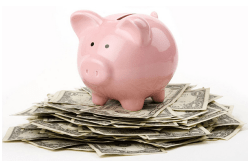 The slogan elegantly captures the idea that we all have more money than we realize. The problem is, most of us don’t keep track of how we spend it. We’ve all had that moment when we look at our bank account balance and think “Where did my money go? I have nothing to show for it!” Lots of little purchases can add up to the feeling of having no money. The reality is, we simply need to keep track of our spending. When we do, we might be satisfied with where our money goes but, if not, we’re armed with the information we need to make changes.
The slogan elegantly captures the idea that we all have more money than we realize. The problem is, most of us don’t keep track of how we spend it. We’ve all had that moment when we look at our bank account balance and think “Where did my money go? I have nothing to show for it!” Lots of little purchases can add up to the feeling of having no money. The reality is, we simply need to keep track of our spending. When we do, we might be satisfied with where our money goes but, if not, we’re armed with the information we need to make changes.
Let’s do some math. Maybe you like to grab a coffee on the way to work each morning. At Tim Hortons that would cost you $1.70 for a medium and at Starbucks a Grande would be about $2.10. For this exercise, let’s pretend you get four weeks vacation and 10 statutory holidays. That means you would buy 230 cups of coffee, or spend between $391 and $483 a year. Let’s imagine you go out to lunch a couple of times a week at $8 a shot. That’s another $768. We can all think of lots of other small, repetitive purchases we make but let’s just use these two for now. If you eliminated those purchases you would have $1,205 every year to invest. Now let’s imagine you do that for 10 years and you manage a return of 5.63% which is our annualized return at the time I’m writing this. After 5 years you’d have over $7,100, after 10 years you’d have about $16,500 and after 20 years it would be almost $45,300! (For this calculation we did not increase your contribution for inflation. If we had, you’d have even more money.)
Now, I’m not suggesting you give up coffee and going out for lunch. If you enjoy those – great! Pick any small, regular expense you have – cable bill, cell phone package extras, whatever. The point is we all have little expenses that add up without our realizing. We could cut out some of those as a small sacrifice andmake a big difference to our retirement savings.


